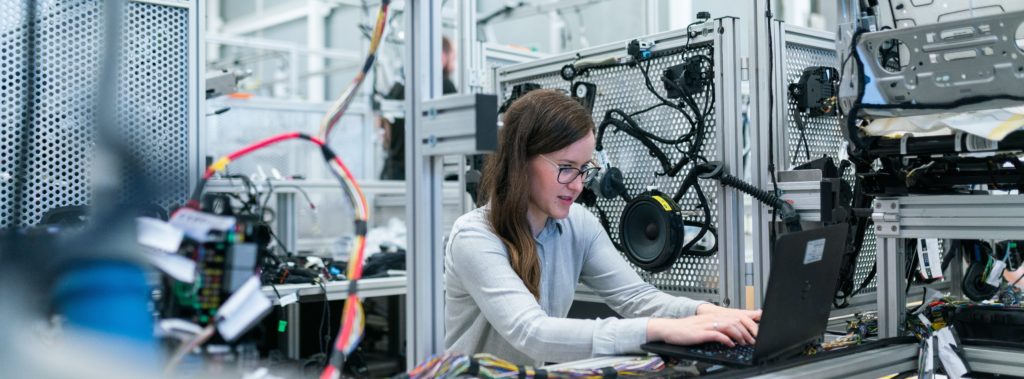
This year Planet4 partner Rzeszów University of Technology collected feedback about Industry 4.0 Training needs from students, academics and companies and filtered through the lens of the market needs and experience of the partner companies.
The information was collected from 70 companies from 25 countries. It is micro companies (13%), small companies (19%), medium companies (26%) and large companies (42%) operating in aerospace, machine, metallurgical, automotive, food, energy, software, chemical, and other industries. In the research departments as R&D, Manufacturing, Technology, IT, Data Science, Maintenance, Management, and others were involved.
Research in the companies was performed to have a wider scope of the industrial problems and needs. The shortcomings of the current educational offer on Artificial Intelligence, Machine Learning, Internet of Things and Edge Computing are identified and the contribution of the companies to the process in order to close the gap between theoretical knowledge and practical use is adjusted.
Research conducted among academics was performed to identify the topics and technologies connected with AI, ML, IoT and EC, which are used in educational programs. Total number of received questionnaires in the research was 144. The information presented in this report comes from 86 questionnaires filled by academics from 23 countries who teach the topics connected with AI, ML, IoT and EC.
Research conducted among students was performed to understand what are the current students’ competences connected with AI, ML, IoT and EC, which can be used to solve industrial problems. The information presented in this report comes from 563 questionnaires received from students studied in 39 countries.
Special focus was given to providing the answers to the “why” training is needed, “how” will training cure the problems identified, “what” is the best way to get the best results and “when” training should take place.
The answers revealed:
- What is the current situation in “AI and ML on the edge for I-IOT” both in research and training
- What are future trends in research, what are the current problems from a lack of training
- What are the main gaps in skills, if training can be replaced and, if so, how?
- How to make reliable recommendations on tailored training and other action?
- How the educational providers are reacting to the technological changes affecting the companies’ productivity?
Training needs analysis is the cornerstone of the Planet4 project and this outcome will influence all the future tasks. Therefore, special care will be given to ensure the reliability, validity, and trustworthiness of this result.
How Planet4 training will solve the Industry 4.0 problems?
If the academics are aware of the industrial problems and have access to industrial sample data and case studies they can explain better the technologies which can be applied to use these problems. In the survey there were identified five main problems and eleven technologies that are taught insufficiently.
These problems are:
- Vertical interconnection and integration (between departments in a factory).
- Horizontal interconnection and integration (between different actors of the supply chain).
- Production on demand enabling technology.
- Product servitization.
- Automatic consumables reorder.
If there is a goal to help to solve 20% of the problems that industry partners signaled in their surveys then new training programs should focus on technologies given below:
- Connectivity.
- Data engines.
- Databases
- Non SQL DB.
- Time series DB.
- Microcontroller programming and RTOS.
- Microprocessor programming and embedded Linux.
- Serverless programming.
- Data Visualization and Dashboarding.
- Device management.
- Signal Processing.
Training needs for industrial companies
Research conducted in industry has shown that companies still need to have the knowledge about the I4.0 solutions and how to implement them. At least 20% of the companies want to implement, among others, SCADA systems, big data analytics, intelligent process supervision and diagnosis, intelligent tools, Business Intelligence and decision support systems. However, the practical skills of employees of these enterprises needed to implement and operate I4.0 solutions are largely insufficient. Less than 30% of companies assessed that they have at least an average degree of practical skills related to AI, ML, IoT, EC and autonomous systems. Therefore, it is crucial to provide knowledge in this field to students who will become employees of these companies in the future. The student should:
- acquire knowledge of existing IT systems and technologies that support I4.0 solutions both in the technical and soft areas,
- be aware that existing technologies should be constantly developed,
- know that new technologies should be created (e.g. cognitive systems) in order to fully meet the needs of businesses in the future.
The surveyed companies indicated their needs that may suggest what to focus on in educating students. These needs mainly concern:
- implementation of integrated IT systems (MES, MIS), implementation of automatic data collection systems and intelligent condition monitoring systems, implementation of integrated platforms for automatic data exchange between IT systems,
- skills connected with programming, data science, industrial automatons, data security,
- soft competences required for the implementation of I4.0.
Due to the fact that there are many issues present in the industry, it is worthwhile to rank their importance.
Student surveys showed which areas and applications of AI, IoT and EC are better known to students, and which are less known. Increasing the level of students’ knowledge in the areas and applications that are currently less known may be the most desirable due to implementation of the Industry 4.0 concept in today’s enterprises.
Moreover, the students indicated what, in their opinion, is important for the effective transfer of knowledge. One of the many recommendations relates to teaching techniques. The survey revealed which forms of education are most appropriate for teaching AI, ML, IoT and EC. According to students, laboratory classes are the most useful. Following are Project Based Learning (individual work), Project Based Learning (team work) and workshops. Practical realization of some tasks (e.g. in a project) gives students the most knowledge and skills in the field of AI. The conducted research shows that students participating in AI-projects are characterized by a greater level of knowledge in the field of AI compared to other students. Moreover, it was assumed, that digital presentations can substitute the lectures as they can be enriched with the animations, movies, practical industrial examples.

A good way to apply project-based learning can be the creation of interdisciplinary project groups . That kind of teams can be created between the students who study different engineering fields. Moreover, these students may come from different universities or even different countries, and the work of the students could be supervised by representatives of the industry.
For the skills it was assumed that the best way to ensure that the student will acquire the necessary skills is problem based learning and project based learning. When the student have to solve a certain problem have to reach a goal. Therefore, there are focused to achieve the certain target by inventing a solution. Project based learning approach allows the students to follow a certain methodology which minimalize a risk of failure.
The interdisciplinary teams are recommended to be worked on the joint projects or collaborate to each other in the form of knowledge exchange. This will create the awareness of a wider context of the analyzed problems.


